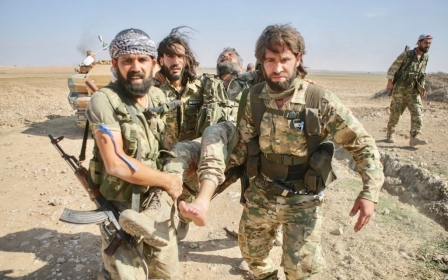Kurds announce deal with Damascus on troop deployment to confront Turkish offensive

The Kurdish administration in northern Syria on Sunday announced a deal with the Damascus government on a Syrian troop deployment near the border with Turkey to confront Ankara's offensive.
"In order to prevent and confront this aggression, an agreement has been reached with the Syrian government... so that the Syrian army can deploy along the Syrian-Turkish border to assist the Syrian Democratic Forces (SDF)," the Kurdish administration said in a statement on its Facebook page, according to AFP.
The Kurdish administration did not give further details on the agreement or say if it would compromise Kurdish self-rule in the north. Damascus rejects their self-rule and wants central government institutions restored in Kurdish-held areas, especially in the oil-rich east.
According to Rami Abdel Rahman, head of the Syrian Observatory for Human Rights war monitor, the Kurdish administration and the SDF "made compromises to Syria in order to stop the advance of the Turkish forces in the north".
Stay informed with MEE's newsletters
Sign up to get the latest alerts, insights and analysis, starting with Turkey Unpacked
On Sunday before the announcement, state news agency SANA had said that the Syrian army sent troops to "confront the Turkish aggression" in the north of the country where Ankara is battling Kurdish-led forces. "Syrian... army units moved north to confront Turkish aggression on Syrian territory," SANA said, without giving further details.
The report came as a Kurdish official said "negotiations" were underway between the Kurds and the Damascus government. "All the options are being examined in the face of the Turkish offensive," the Kurdish official said. "The government must assume its responsibilities to confront the aggression."
Syria and the Kurdish-led Syrian Democratic Forces (SDF) have been holding negotiations at a Russian airbase in Syria, a Syrian Kurdish politician told Reuters on Sunday, expressing hope for a deal that would halt a Turkish attack.
Russia is President Bashar al-Assad's most powerful ally.
Ahmed Suleiman, a senior member of the Kurdish Democratic Progressive Party in Syria, said the talks were being held at Russia's Hmeimim airbase in Latakia.
He did not say if he or his party - which is independent from the SDF - had a role in the negotiations.
Asked about Suleiman's comments, the head of the SDF media office, Mustafa Bali, said "no comment", then added: "We have confirmed from the start of the invasion that we will study all options that could spare our people ethnic cleansing."
Suleiman said he hoped for an agreement between the sides that would "halt the ongoing war and especially its catastrophic and dangerous consequences".
He said the talks may be moved to Damascus, from where he was speaking with Reuters via Whatsapp messenger.
"We are now in Damascus, this is what I can say at present. We hope an agreement is reached that halts the war and its dangerous and catastrophic consequences on the citizens east of the Euphrates".
His party, one of Syria's oldest Kurdish groups, is not involved in the autonomous administration set up by the SDF and other Kurdish groups such as the PYD party in northern Syria.
Earlier on Sunday, US Defence Secretary Mark Esper said the United States was poised to evacuate about 1,000 US troops from northern Syria after learning that Turkey planned to extend its incursion farther south and west than originally planned.
Another consideration in the decision, Esper indicated, was that the SDF was looking to make a deal with Russia to counter the Turkish offensive.
Middle East Eye delivers independent and unrivalled coverage and analysis of the Middle East, North Africa and beyond. To learn more about republishing this content and the associated fees, please fill out this form. More about MEE can be found here.





